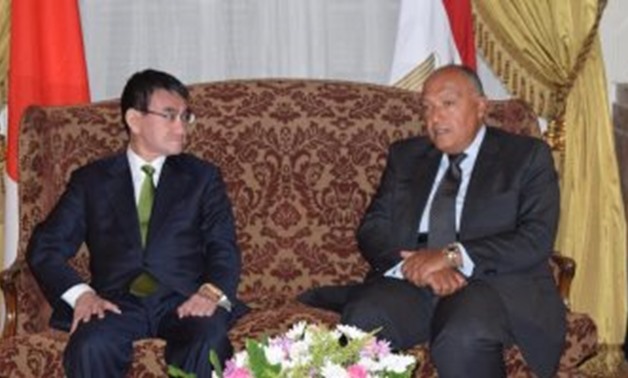
Egypt's Minister Sameh Shoukry meets Japanese Foreign Minister Fumio Kishida
CAIRO - 11 September 2017: Foreign Minister Sameh Shoukry on Monday said current imbalance between the Arab states and Israel regarding nuclear commitments is no longer acceptable.
Addressing the first session of the Ministerial Meeting for the Arab-Japanese Political Dialogue, currently being held in Cairo, the minister added that the Japan-Arab Economic Forum, which kicked off in December 2009, launched an important stage in the joint Arab-Japanese action
The forum developed an understanding framework between the Arabs and Japan in the economic, trade and development fields to serve existing cooperation relations in the fields of oil and gas, human development and technology resettlement in the Arab world, Shoukry said.
As a result of Arab-Japanese distinguished relations, it was necessary to promote them to higher levels to include political coordination and exchange of views on regional and international issues of common concern, he added.
Shoukry said the entire world faces real problems in political and social situations, as the nation-state principle, established by State sovereignty in 1648 faces serious challenges that threaten the cohesion of countries and affect stability and hence international security.
The Arab world adheres to its common vision to resolve the Arab-Israeli conflict in accordance with the relevant Security Council resolutions, the principle of land for peace, and a two-state solution living side by side in peace and security, he added.
The 2002 Arab Peace Initiative, which clearly embodied the Arabs' strategic choice for peace, is the best proof of Arab adherence to a peaceful resolution of the Arab-Israeli conflict in order to achieve a just and comprehensive peace in the region, the minister said.
The current crises in Syria, Libya, and Yemen make it necessary to adopt unified positions based on preserving the national-states as a basis for any solution and adopting dialogue as a mechanism for resolving disputes and conflicts to ensure the stability of the region in favor of peoples, global and regional stability, he added.
Shoukry urged the international community to adopt a comprehensive approach to combating terrorism that does not stop at military confrontations and security cooperation, but extends to economic, social and developmental dimensions.
Egypt's commitment to nuclear disarmament and the principles of the Nuclear Non-Proliferation Treaty (NPT) have been consistent over the past decades, as an issue that has been put as a top priority for Egypt's foreign policy in the light of a firm belief that the elimination of nuclear weapons requires joint international action, the minister said.
Egypt has condemned in the strongest terms North Korea's sixth nuclear test and the launch of a ballistic missile that violated the Japanese airspace and endangered its people, and jeopardized the stability of the entire East Asia region, he added.
We look forward to Japan's taking a similar principled position in support of the Arab position on Israel's nuclear capabilities, as the current imbalance between the Arab states and Israel regarding nuclear commitments is no longer acceptable, Shoukry said.
Israel remains the solo country in the Middle East that refuses to accede to the NPT, he added.

Comments
Leave a Comment